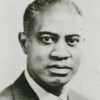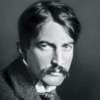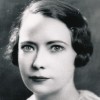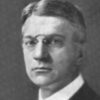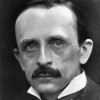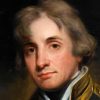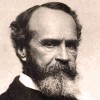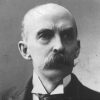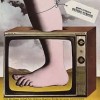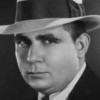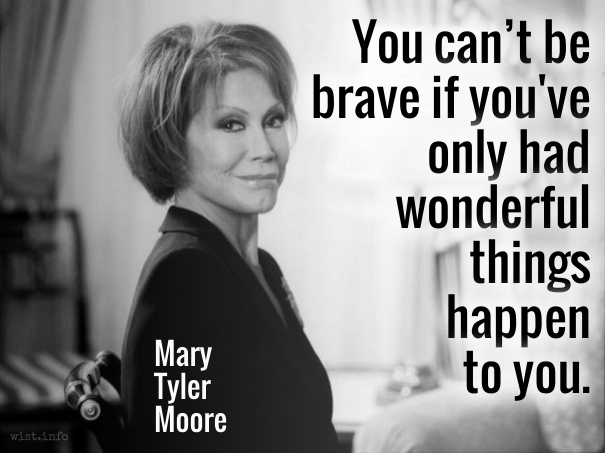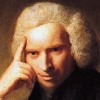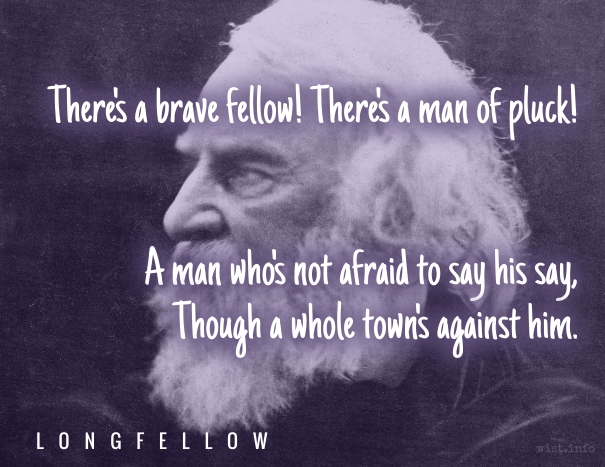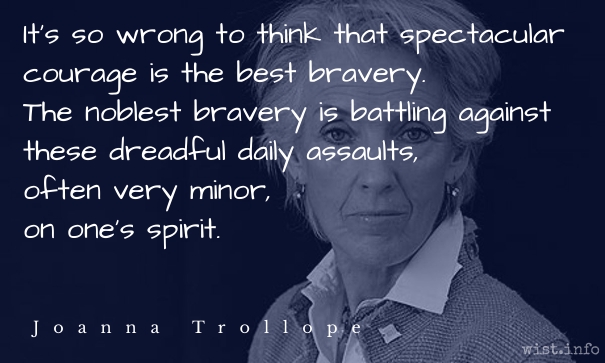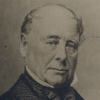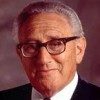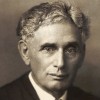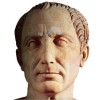Piglet took Pooh’s arm, in case Pooh was frightened.
A. A. Milne (1882-1956) English poet and playwright [Alan Alexander Milne]
House at Pooh Corner, ch. 4 “Tiggers Don’t Climb Trees” (1928)
(Source)
Quotations about:
bravery
Note not all quotations have been tagged, so Search may find additional quotes on this topic.
And it is not always because of valour or chastity that men are valiant or women chaste.
[Et ce n’est pas toujours par valeur et par chasteté que les hommes sont vaillants et que les femmes sont chastes.]François VI, duc de La Rochefoucauld (1613-1680) French epigrammatist, memoirist, noble
Réflexions ou sentences et maximes morales [Reflections; or Sentences and Moral Maxims], ¶1 (1665-1678) [tr. Tancock (1959)]
(Source)
Introduced in the 4th ed. (1665).
(Source (French)). Alternate translations:
It may be further affirmed, that Valour in Men, and Chastity in Women, two qualifications which make so much noise in the World, are the products of Vanity and Shame, and principally of their particular Temperaments.
[tr. Davies (1669), ¶94]
And we are much mistaken, if we think that Men are always stout from a principle of Valour, or Women chast from a principle of Modesty.
[tr. Stanhope (1694)]
It is not always from the principles of valour and chastity that men are valiant, and that women are chaste.
[pub. Donaldson (1783), ¶446]
It is not always from valor and from chastity that men are valiant, and that women are chaste.
[ed. Gowens (1851), ¶2]
It is not always from valour or from chastity that men are brave, and women chaste.
[tr. Bund/Friswell (1871)]
Men are not always brave because courageous, nor women chaste because virtuous.
[tr. Heard (1917)]
So it is not always courage that makes the hero, nor modesty the chaste woman.
[tr. Stevens (1939)]
It is not always valor which makes men valiant, nor chastity that renders women chaste.
[tr. FitzGibbon (1957)]
And it is not always through valor and chastity that men are valiant and women chaste.
[tr. Kronenberger (1959)]
It is not always because of bravery or chastity that men are brave, and women chaste.
[tr. Whichello (2016)]
So this is my wish, a wish for me as much as it is a wish for you: in the world to come, let us be brave — let us walk into the dark without fear, and step into the unknown with smiles on our faces, even if we’re faking them.
And whatever happens to us, whatever we make, whatever we learn, let us take joy in it. We can find joy in the world if it’s joy we’re looking for, we can take joy in the act of creation.
So that is my wish for you, and for me. Bravery and joy.Neil Gaiman (b. 1960) British author, screenwriter, fabulist
Blog entry (2012-12-31), “My New Year’s Wish”
(Source)
Cowardice or Bravery is never racial. You find both in every Country. No country has a monopoly on Bravery; great deeds of heroism is liable to break out in the most unexpected places.
Will Rogers (1879-1935) American humorist
“More Letters of a Self-Made Diplomat,” Saturday Evening Post (1932-03-12)
(Source)
Every man’s last day is fixed.
Lifetimes are brief and not to be regained,
For all mankind. But by their deeds to make
Their fame last: that is labor for the brave.[Stat sua cuique dies, breve et inreparabile tempus
Omnibus est vitae; sed famam extendere factis,
Hoc virtutis opus.]Virgil (70-19 BC) Roman poet [b. Publius Vergilius Maro; also Vergil]
The Aeneid [Ænē̆is], Book 10, l. 467ff (10.467-69) [Jove] (29-19 BC) [tr. Fitzgerald (1981)]
(Source)
Jove, to Alcides (Hercules), comforting him on the pending, but brave, death of Pallas.
(Source (Latin)). Alternate translations:
Each hath his fate; Short and irreparable time
Man's life enjoyes: But by brave deeds to clime
To honour's height, this they by valour gain.
[tr. Ogilby (1649)]
Short bounds of life are set to mortal man.
'Tis virtue's work alone to stretch the narrow span.
[tr. Dryden (1697)]
To every one his day is fixed: a short and irretrievable term of life is given to all: but by deeds to lengthen out fame, this is virtue's task.
[tr. Davidson/Buckley (1854)]
Each has his destined time: a span
Is all the heritage of man:
'Tis virtue's part by deeds of praise
To lengthen fame through after days.
[tr. Conington (1866)]
To every one his day
Stands fixed by fate. The term of mortal life
Is brief, and irretrievable to all.
But to extend the period of its fame
By noble actions, this is virtue's work.
[tr. Cranch (1872), l. 615ff]
Each hath his own appointed day; short and irrecoverable is the span of life for all: but to spread renown by deeds is the task of valour.
[tr. Mackail (1885)]
His own day bideth every man; short space that none may mend
Is each man's life: but yet by deeds wide-spreading fame to send,
Man's valour hath this work to do.
[tr. Morris (1900)]
Each hath his day; irreparably brief
Is mortal life, and fading as the leaf.
'Tis valour's part to bid it bloom anew
By deeds of fame.
[tr. Taylor (1907), st. 63, l. 562ff]
To each his day is given. Beyond recall
man's little time runs by: but to prolong
life's glory by great deeds is virtue's power.
[tr. Williams (1910)]
Each has his day appointed; short and irretrievable is the span of life to all: but to lengthen fame by deeds -- that is valour's task.
[tr. Fairclough (1918)]
Every man, my son,
Has his appointed time; life’s day is short
For all men; they can never win it back,
But to extend it further by noble deeds
Is the task set for valor.
[tr. Humphries (1951)]
Every man's hour is appointed. Brief and unalterable
For all, the span of life. To enlarge his fame by great deeds
Is what the brave man must aim at.
[tr. Day-Lewis (1952)]
Each has his day; there is, for all, a short,
irreparable time of life; the task
of courage: to prolong one's fame by acts.
[tr. Mandelbaum (1971), l. 648ff]
Each man has his allotted day. All life is brief and time once past can never be restored. But the task of the brave man is to enlarge his fame by his actions.
[tr. West (1990)]
Every man has his day, the course
of life is brief and cannot be recalled: but virtue’s task
is this, to increase fame by deeds.
[tr. Kline (2002)]
Each man has his day, and the time of life
is brief for all, and never comes again.
But to lengthen out one’s fame with action,
that’s the work of courage.
[tr. Fagles (2006), l. 553ff]
The day of death awaits all men; their time is brief and comes just once. But they can prolong their fame by action. This is the task of valor.
[tr. Bartsch (2021)]
Yield not to evils, but the bolder thou
Persist, defiant of misfortune’s frown,
And take the path thy Destinies allow.[Tu ne cede malis, sed contra audentior ito
Quam tua te fortuna sinet.]Virgil (70-19 BC) Roman poet [b. Publius Vergilius Maro; also Vergil]
The Aeneid [Ænē̆is], Book 6, l. 95ff (6.95-96) [The Sybil] (29-19 BC) [tr. Taylor (1907), st. 15, ll. 12]
(Source)
Stoic maxim. There is argument as to whether it should be quam or qua, leading to some variations in translating the second half of the quotation.
(Source (Latin)). Alternate translations:
Yet dangers fear not, but on bolder goe,
What course thy fortune grants
[tr. Ogilby (1649)]
But thou, secure of soul, unbent with woes,
The more thy fortune frowns, the more oppose.
[tr. Dryden (1697)]
Yield not under your sufferings, but encounter them with greater boldness than your fortune shall permit.
[tr. Davidson/Buckley (1854)]
Yet still despond not, but proceed
Along the path where Fate may lead.
[tr. Conington (1866)]
Yet yield not thou, but go more boldly on,
Where Fortune leads, till victory be won.
[tr. Cranch (1872), ll. 121-122]
Yield not thou to distresses, but all the bolder go forth to meet them, as thy fortune shall allow thee way.
[tr. Mackail (1885)]
But thou, yield not to any ill, but set thy face, and wend
The bolder where thy fortune leads.
[tr. Morris (1900)]
Oh! yield not to thy woe, but front it ever,
And follow boldly whither Fortune calls.
[tr. Williams (1910)]
Yield not thou to ills, but go forth to face them more boldly than thy Fortune shall allow thee!
[tr. Fairclough (1916)]
Do not yield to evil,
Attack, attack, more boldly even than fortune
Seems to permit.
[tr. Humphries (1951)]
But never give way to those evils: face them all the more boldly,
Using what methods your luck allows you.
[tr. Day-Lewis (1952)]
Do not relent before distress, but be
far bolder than your fortune would permit.
[tr. Mandelbaum (1971), ll. 132-33]
Never shrink from blows.
Boldly, more boldly where your luck allows,
Go forward, face them.
[tr. Fitzgerald (1981), ll. 143-45]
You must not give way to these adversities but must face them all the more boldly wherever your fortune allows it.
[tr. West (1990)]
Do not give way to misfortunes, meet them more bravely,
as your destiny allows.
[tr. Kline (2002)]
Do not yield, but oppose your troubles
All the more boldly, as far as your fate
And fortune allow.
[tr. Lombardo (2005)]
But never bow to suffering, go and face it,
all the bolder, wherever Fortune clears the way.
[tr. Fagles (2006), ll. 113-14]
Don’t yield to evils, but go boldly forward
Where your fortune bids you.
[tr. @sentantiq (2018)]
Don't give up at these misfortunes. Be as brave as Fortune lets you.
[tr. Bartsch (2021)]
ENOBARBUS: When valor preys on reason,
It eats the sword it fights with.William Shakespeare (1564-1616) English dramatist and poet
Antony and Cleopatra, Act 3, sc. 13, ll. 240ff (3.13.240-241) (1607)
(Source)
The gentleman admires rightness above all. A gentleman who possessed courage but lacked a sense of rightness would create political disorder, while a common person who possessed courage but lacked a sense of rightness would become a bandit.
[君子義以爲上、君子有勇而無義、爲亂、小人有勇而無義、爲盜]
[君子义以为上君子有勇而无义为乱小人有勇而无义为盗]Confucius (c. 551- c. 479 BC) Chinese philosopher, sage, politician [孔夫子 (Kǒng Fūzǐ, K'ung Fu-tzu, K'ung Fu Tse), 孔子 (Kǒngzǐ, Chungni), 孔丘 (Kǒng Qiū, K'ung Ch'iu)]
The Analects [論語, 论语, Lúnyǔ], Book 17, verse 23 (17.23) (6th C. BC – AD 3rd C.) [tr. Slingerland (2003)]
(Source)
When asked if a gentleman (junzi) values valor. Annping Chin's notes suggest that the two uses of junzi are different: the first, speaking in general of a moral person, the second of a person of high status (vs the person of low status, xiaoren) following).
(Source (Chinese) 1, 2). Alternate translations:
The superior man holds righteousness to be of highest importance. A man in a superior situation, having valour without righteousness, will be guilty of insubordination; one of the lower people having valour without righteousness, will commit robbery.
[tr. Legge (1861)]
Righteousness he counts higher. A gentleman who is brave without being just may become turbulent; while a common person who is brave and not just may end in becoming a highwayman.
[tr. Jennings (1895)]
A gentleman esteems what is right as of the highest importance. A gentleman who has valour, but is without a knowledge and love of what is right, is likely to commit a crime. A man of the people who has courage, but is without the knowledge and love of what is right, is likely to become a robber.
[tr. Ku Hung-Ming (1898)]
Men of the superior class deem rectitude the highest thing. It is men of the superior class, with courage but without rectitude, who rebel. It is men of the lower class, with courage but without rectitude, who become robbers.
[tr. Soothill (1910)]
The proper man puts equity at the top, if a gentleman have courage without equity it will make a mess; if a mean man have courage without equity he will steal.
[tr. Pound (1933)]
A gentleman gives the first place to Right. If a gentleman has courage but neglects Right, he becomes turbulent. If a small man has courage but neglects Right, he becomes a thief.
[tr. Waley (1938)]
The perfect gentleman is given to justice and assigns to it first place. If the perfect gentleman possesses courage but not justice, there will be disorders. In the case of the mean man, there will be burglaries.
[tr. Ware (1950), 17.21]
For the gentleman it is morality that is supreme. Possessed of courage but devoid of morality, a gentleman will make trouble while a small man will be a brigand.
[tr. Lau (1979)]
Rightness the gentleman regards as paramount; for if a gentleman has courage but lacks a sense of right and wrong, he will cause political chaos; and if a small man has courage but lacks a sense of right and wrong, he will commit burglary.
[tr. Dawson (1993), 17.21]
A gentleman puts justice above everything. A gentleman who is brave but not just may become a rebel; a vulgar man who is brave but not just may become a bandit.
[tr. Leys (1997)]
The gentleman regards righteousness as supreme. A gentleman who possesses courage but wants righteousness will become rebel; a small man who possesses courage but wants righteousness will become a bandit. [tr. Huang (1997), 17.22]A gentleman stresses the righteousness as a top rule. If a gentleman has the braveness but no righteousness, will be disordered. If a mean person has the braveness but no righteousness, will be a robber.
[tr. Cai/Yu (1998), No. 463]
In fact, the exemplary person gives first priority to appropriate conduct (yi). An exemplary person who is bold yet is lacking a sense of appropriateness will be unruly, while a petty person of the same cut will be a thief.
[tr. Ames/Rosemont (1998)]
With the gentleman, right comes before all else. If a gentleman has courage but lacks a sense of right, he will make a rebellion. If a little man has courage but lacks a sense of right, he will become a thief.
[tr. Brooks/Brooks (1998), 17:21]
The noble-minded honor Duty above all. In the noble-minded, courage without Duty leads to turmoil. In little people, courage without Duty leads to theft and robbery.
[tr. Hinton (1998), 17.22]
The gentleman holds rightness in highest esteem. A gentleman who possesses courage but lacks rightness will become rebellious. A petty man who possesses courage but lacks rightness will turn to thievery.
[tr. Watson (2007)]
The gentleman (junzi) puts rightness at the top. If a man of high status (junzi) has courage but not a sense of rightness, he will create political upheaval. If a lowly man has courage but not a sense of rightness, he will turn to banditry.
[tr. Annping Chin (2014)]
A Jun Zi's top objective is righteousness. If a Jun Zi has valor but acts against righteousness, he is prone to make trouble. If a Xiao Ren has valor but acts against righteousness, he is prone to commit crimes.
[tr. Li (2020)]
But a man can be physically courageous and morally craven.
Melvin B. Tolson (1898-1966) American poet, educator, columnist, politician
“Paul Robeson Rebels against Hollywood’s Dollars,” Caviar and Cabbage column, Washington Tribune (25 Mar 1939)
(Source)
He wishes that he, too, had a wound, a red badge of courage.
‘A time may come soon,’ said he, ‘when none will return. Then there will be need of valour without renown, for none shall remember the deeds that are done in the last defence of your homes. Yet the deeds will not be less valiant because they are unpraised.’
J.R.R. Tolkien (1892-1973) English writer, fabulist, philologist, academic [John Ronald Reuel Tolkien]
The Lord of the Rings, Vol. 3: The Return of the King, Book 5, ch. 2 “The Passing of the Grey Company” [Aragorn to Éowyn] (1955)
(Source)
Fighting is like champagne. It goes to the heads of cowards as quickly as of heroes. Any fool can be brave on a battlefield when it’s be brave or else be killed.
Margaret Mitchell (1900-1949) American author and journalist.
Gone with the Wind, ch. 31 [Ashley] (1936)
(Source)
It takes more courage to live than to die; which is proved by the fact that so many more men die well than live well.
William Lyon Phelps (1865-1943) American educator and critic
Representative Plays by J. M. Barrie, Introduction, § 2 (1926)
(Source)
Courage is the thing. All goes if courage goes.
James Barrie (1860-1937) Scottish novelist and dramatist
“Courage,” Rectoral Address, University of St. Andrews, Scotland (1922-05-03)
(Source)
The brave dies perhaps two thousand deaths if he’s intelligent. He simply doesn’t mention them.
Ernest Hemingway (1899-1961) American writer
A Farewell to Arms, ch. 21 [Catherine] (1929)
(Source)
Referring to a common paraphrase of Shakespeare's Julius Caesar (2.2.34) "The coward dies a thousand deaths, the brave but one."
CAESAR: Cowards die many times before their deaths;
The valiant never taste of death but once.
Of all the wonders that I yet have heard,
It seems to me most strange that men should fear,
Seeing that death, a necessary end,
Will come when it will come.William Shakespeare (1564-1616) English dramatist and poet
Julius Caesar, Act 2, sc. 2, l. 34ff (2.2.34-39) (1599)
(Source)
The initial phrase has seemingly morphed in the retelling, though still being cited to Shakespeare: "A coward dies a thousand times before his death, but the valiant taste of death but once." This is the form most often seen, but is not Shakespeare.
In A Farewell to Arms (1929), Hemingway gives another paraphrase: "The coward dies a thousand deaths, the brave but one." This, too, sometimes gets modified to make it scan better, e.g., "A coward dies a thousand deaths, the brave dies only once."
We are all born brave, trusting and greedy, and most of us manage to remain greedy.
Mignon McLaughlin (1913-1983) American journalist and author
The Second Neurotic’s Notebook, ch. 9 (1966)
(Source)
When day comes we step out of the shade,
aflame and unafraid.
The new dawn blooms as we free it,
For there is always light,
if only we’re brave enough to see it,
If only we’re brave enough to be it.Amanda Gorman (b. 1998) American poet and activist
“The Hill We Climb” (2021)
(Source)
Read at the Presidential Inauguration (20 Jan 2021).
Lots of people would be as cowardly as me if they were brave enough.
Oh friends, be men! Deep treasure in your hearts
An honest shame, and, fighting bravely, fear
Each to incur the censure of the rest.
Of men so minded more survive than die,
While dastards forfeit life and glory both.[ὦ φίλοι ἀνέρες ἔστε, καὶ αἰδῶ θέσθ᾽ ἐνὶ θυμῷ,
ἀλλήλους τ᾽ αἰδεῖσθε κατὰ κρατερὰς ὑσμίνας.
αἰδομένων δ᾽ ἀνδρῶν πλέονες σόοι ἠὲ πέφανται:
φευγόντων δ᾽ οὔτ᾽ ἂρ κλέος ὄρνυται οὔτέ τις ἀλκή.]Homer (fl. 7th-8th C. BC) Greek author
The Iliad [Ἰλιάς], Book 15, l. 561ff (15.561) [Ajax] (c. 750 BC) [tr. Cowper (1791), l. 679ff]
(Source)
Original Greek. Alternate translations:
Good friends, bring but yourselves to feel the noble stings of shame
For what ye suffer, and be men. Respect each other’s fame;
For which who strives in shame’s fit fear, and puts on ne’er so far,
Comes oft’ner off. Then stick engag’d; these fugitives of war
Save neither life, nor get renown, nor bear more mind than sheep.
[tr. Chapman (1611), l. 508ff]
O Greeks! respect your fame,
Respect yourselves, and learn an honest shame:
Let mutual reverence mutual warmth inspire,
And catch from breast to breast the noble fire.
On valour's side the odds of combat lie,
The brave live glorious, or lamented die;
The wretch that trembles in the field of fame,
Meets death, and worse than death, eternal shame.
[tr. Pope (1715-20)]
O my friends, be men, and set honour in your hearts, and have reverence for each other during the vehement conflicts. For more of those men who reverence each other are saved than slain; but of the fugitives, neither glory arises, nor any defence.
[tr. Buckley (1860)]
Brave comrades, quit ye now like men;
Bear a stout heart; and in the stubborn fight
Let each to other mutual succour give;
By mutual succour more are sav’d than fall;
In timid flight nor fame nor safety lies.
[tr. Derby (1864)]
My friends, be men, and fear dishonour; quit yourselves in battle so as to win respect from one another. Men who respect each other's good opinion are less likely to be killed than those who do not, but in flight there is neither gain nor glory.
[tr. Butler (1898)]
My friends, be men, and take ye shame in your hearts, and have shame each of the other in the fierce conflict. Of men that have shame more are saved than are slain; but from them that flee springeth neither glory nor any avail.
[tr. Murray (1924)]
Friends, respect yourselves as men,
respect each other in the moil of battle!
Men with a sense of shame survive
more often than they perish. Those who run
have neither fighting power nor any honor.
[tr. Fitzgerald (1974)]
Be men, my friends! Discipline fill your hearts!
Dread what comrades say of you here in bloody combat!
When men dread that, more men come through alive --
when soldiers break and run, good-bye glory,
good-bye all defenses!
[tr. Fagles (1990), l. 651ff]
Now, dear friends, be men, keep hold of your valorous spirit,
feel shame, each on account of the rest in the violent combats;
more of the men who feel such shame live safely than perish,
while from the ones who flee no glory nor any defense springs.
[tr. Merrill (2007), l. 529ff]
Success covers a multitude of blunders, and the want of it hides the greatest gallantry and good conduct.
Horatio Nelson (1758-1805) British admiral
Letter to Andrew Hamond (1797)
(Source)
Often misattributed to George Bernard Shaw.
Always Sir Arthur lost so much blood that it was a marvel he stood on his feet, but he was so full of knighthood that knightly he endured the pain.
M. says he would much rather be a coward than brave because people hurt you when you are brave …
E. M. Forster (1879-1970) English novelist, essayist, critic, librettist [Edward Morgan Forster]
Quoted by Alice Forster in a letter (1883)
(Source)
Ellipsis in original. Forster was 4 years old at the time. In P. N. Furbank, E. M. Forster: The growth of the novelist (1879-1914) (1977).
In the pathway of the sun,
In the footsteps of the breeze,
Where the world and sky are one,
He shall ride the silver seas,
He shall cut the glittering wave.I shall sit at home, and rock;
Rise, to heed a neighbor’s knock;
Brew my tea, and snip my thread;
Bleach the linen for my bed.
They will call him brave.
Brave men earn the right to shape their own destiny.
Arthur M. Schlesinger, Jr. (1917-2007) American historian, author, social critic
“The Decline of Greatness,” Saturday Evening Post (1 Nov 1958)
(Source)
Reprinted in The Politics of Hope, ch. 2 (1963)
Then out spake brave Horatius,
The Captain of the Gate:
“To every man upon this earth
Death cometh soon or late.
And how can man die better
Than facing fearful odds,
For the ashes of his fathers,
And the temples of his Gods?Thomas Babington Macaulay (1800-1859) English writer and politician
“Horatius,” st. 27, Lays of Ancient Rome (1842)
(Source)
I believe in aristocracy, though — if that is the right word, and if a democrat may use it. Not an aristocracy of power, based upon rank and influence, but an aristocracy of the sensitive, the considerate and the plucky. Its members are to be found in all nations and classes, and all through the ages, and there is a secret understanding between them when they meet. They represent the true human tradition, the one permanent victory of our queer race over cruelty and chaos. Thousands of them perish in obscurity, a few are great names. They are sensitive for others as well as for themselves, they are considerate without being fussy, their pluck is not swankiness but the power to endure, and they can take a joke.
There is no more contemptible type of human character that that of the nerveless sentimentalist and dreamer, who spends his life in a weltering sea of sensibility and emotion, but who never does a manly concrete deed.
William James (1842-1910) American psychologist and philosopher
The Principles of Psychology, Vol. 1, ch. 4 “Habit” (1890)
(Source)
This chapter originally published in Popular Science Monthly (Feb 1887).
It’s a funny thing, the less people have to live for, the less nerve they have to risk losing — nothing.
Zora Neale Hurston (1891-1960) American writer, folklorist, anthropologist
Moses, Man of the Mountain, ch. 2 (1939)
(Source)
FALSTAFF: The better part of valour is discretion.
William Shakespeare (1564-1616) English dramatist and poet
Henry IV, Part 1, Act 4, sc. 4, l. 122ff (4.4.122) (1597)
(Source)
We have been the cowards, lobbing cruise missiles from 2,000 miles away. That’s cowardly. Staying in the airplane when it hits the building, say what you want about it, that’s not cowardly. Stupid maybe, but not cowardly.
MINSTREL: [singing]
He was not in the least bit scared to be mashed into a pulp,
Or to have his eyes gouged out and his elbows broken,
To have his kneecaps split and his body burned away,
And his limbs all hacked and mangled, brave Sir Robin!
His head smashed in, and his heart cut out,
And his liver removed, and his bowels unplugged,
And his nostrils raped, and his bottom burnt off,
And his penis —SIR ROBIN: That’s enough music for now, lads.
I could name all day, those women I deem great in Greece alone and the records would scarcely be complete. And what of Joan of Arc and Emma Goldman? Kate Richards O’Hare and Sarah Bernhardt? Katherine the Great and Elizabeth Barrett Browning? H.D. and Sara Teasdale? Isibella of Spain who pawned her gems that Columbus might sail, and Edna St. Vincent Millay? And that queen, Marie, I think her name was, of some small province — Hungary I believe — who fought Prussia and Russia so long and so bitterly. And Rome — oh, the list is endless there, also — most of them were glorified harlots but better be a glorified harlot than a drab and moral drone, such as the text books teach us woman should be. Woman have always been the inspiration of men, and just as there are thousands of unknown great ones among men, there have been countless women whose names have never been blazoned across the stars, but who have inspired men on to glory.
Better hazard once than be always in fear.
Thomas Fuller (1654-1734) English physician, preacher, aphorist, writer
Gnomologia: Adages and Proverbs, # 906 (1732)
(Source)
For man’s only weapon is courage that flinches not from the gates of Hell itself, and against such not even the legions of Hell can stand.
Pain nourishes my courage. You have to fail in order to practice being brave. You can’t be brave if you’ve only had wonderful things happen to you.
Mary Tyler Moore (1936-2017) American actress, producer, and social advocate
Interview, McCall’s, Vol. 108 (1980)
(Source)
The brave only know how to forgive; it is the most refined and generous pitch of virtue human nature can arrive at. Cowards have done good and kind actions, cowards have even fought, nay some times, even conquered; but a coward never forgave. It is not in his nature; the power of doing it flows only from a strength and greatness of soul, conscious of its own force and security, and above the little temptations of resenting every fruitless attempt to interrupt its happiness.
Laurence Sterne (1713-1786) Anglo-Irish novelist, Anglican clergyman
Sermon 12, “Joseph’s History Considered”
(Source)
There’s a brave fellow! There’s a man of pluck!
A man who’s not afraid to say his say,
Though a whole town’s against him.
It is easy to be brave from a safe distance.
Courage is more exhilarating than fear and in the long run it is easier. We do not have to become heroes overnight. Just a step at a time, meeting each thing that comes up, seeing it is not as dreadful as it appeared, discovering we have the strength to stare it down.
True courage … has so little to do with Anger, that there lies always the strongest Suspicion against it, where this Passion is highest. The true Courage is the cool and calm. The bravest of Men have the least of a brutal bullying Insolence; and in the very time of Danger are found the most serene, pleasant, and free. Rage, we know, can make a Coward forget himself and fight. But what is done in Fury, or Anger, can never be plac’d to the account of Courage.
What the world expects of Christians is that Christians should speak out, loud and clear, and that they should voice their condemnation in such a way that never a doubt, never the slightest doubt, could rise in the heart of the simplest man. […] Perhaps we cannot prevent this world from being a world in which children are tortured. But we can reduce the number of tortured children. And if you don’t help us, who else in the world can help us do this?
No one is so brave that he is not disturbed by something unexpected.
[Nemo est tam fortis, quin rei novitate perturbetur.]
Julius Caesar (100-44 BC) Roman general and statesman [Gaius Julius Caesar]
The Gallic Wars [De Bello Gallico], Book 6, ch. 39 (49 BC)
(Source)
Alt. trans.: "No one is so courageous as not to be disconcerted by the suddenness of the affair." [tr. McDevitte and Bohn]








